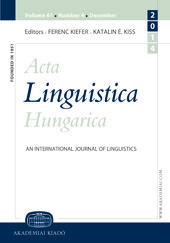The single morpheme -ed/-en of the English past/passive
The single morpheme -ed/-en of the English past/passive
Author(s): Joseph EmondsSubject(s): Lexis
Published by: Akadémiai Kiadó
Keywords: English passive participle; English past tense; grammatical lexicon; PF insertion; lexical entry; perfect tense;
Summary/Abstract: All English regular verbs and about half its irregular verbs have the same form for the finite past tense and the past participle. The finite past tense is different from the participle only for a closed class of about 100 irregular verbs. These latter can be analyzed by a lexical device of wide-ranging applicability called Alternative Realization. All other Past forms of Vs, finite and non-finite, can then be derived from a single morpheme -ed which appears in two contexts: one when V is finite and one when it is selected by a semantically empty stative verb, have or be. There is also a third use of -ed to form passive participles, in both verbal and adjectival passives.The paper presents a formalized system of selection features for lexical items including but going beyond classical subcategorization. This system permits formulating a single full lexical entry for the suffix -ed that covers all its uses. The final version of this entry exemplifies how to specify Alternative Realization, uninterpretability of categories and disjunctive contexts, and independently justifies each of these notations.
Journal: Acta Linguistica Hungarica (Since 2017 Acta Linguistica Academica)
- Issue Year: 59/2012
- Issue No: 1-2
- Page Range: 127-152
- Page Count: 26
- Language: English

